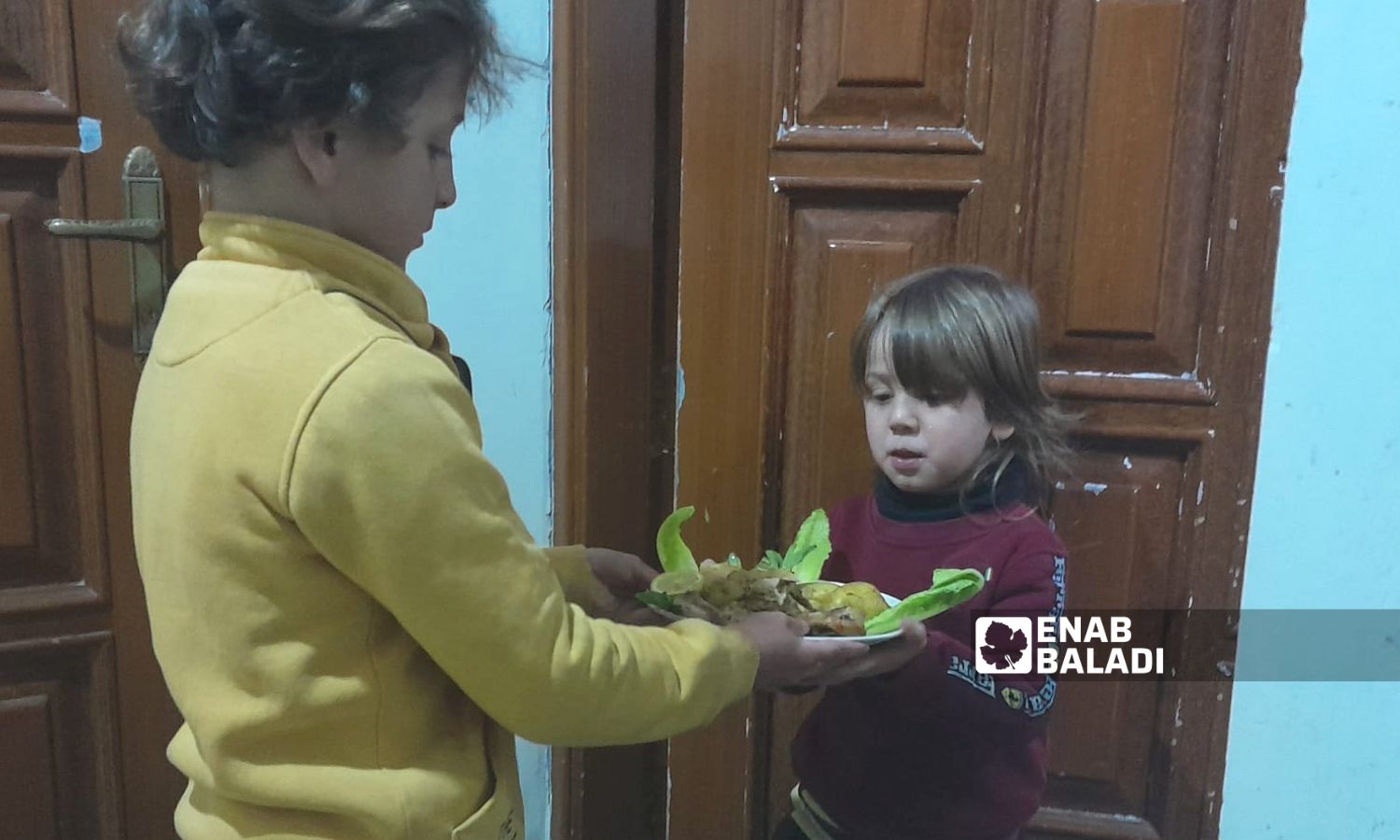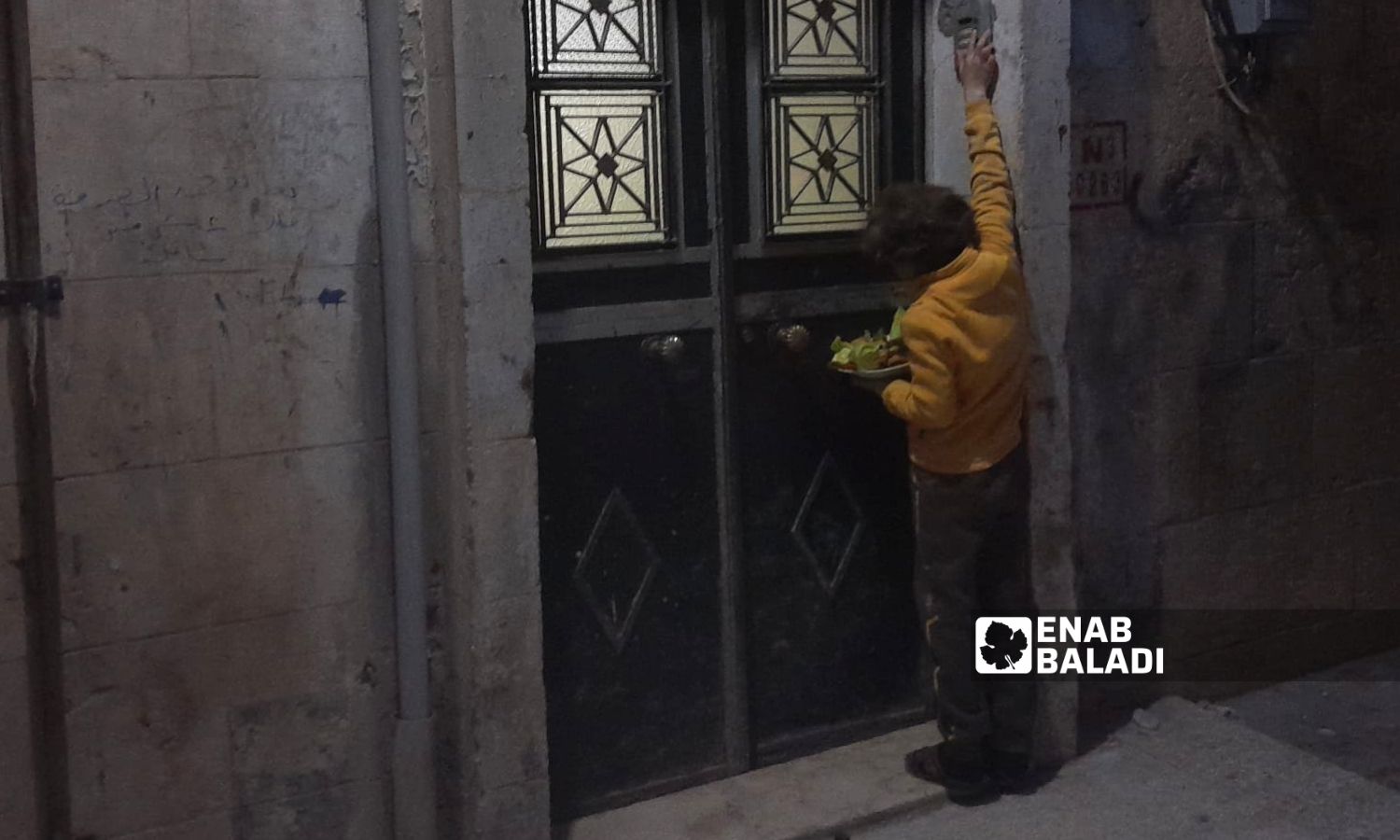



Enab Baladi – Anas al-Khouli
After a hard day of fasting and working as a taxi driver, Mohamad Jawabrah enters his house in the northern city of Idlib to the iftar table decorated with dishes of food that he is not familiar with.
Jawabrah, 36, will taste “Althareed,” the famous meal in the eastern Deir Ezzor governorate. He will also taste the well-known Aleppean “Safarjaliya” and “Harraq Isba’ou,” the famous meal in Damascus and its suburbs.
Such delicious meals were sent by the IDP neighbors as a Ramadan ritual that Syrians try to preserve.
The researcher of Damascene heritage, Mounir Kayyal, says that “Sakba,” especially during Ramadan, is a habit that Syrians have inherited for decades, and it dates back to a popular narration that says that one of the poor in Damascus used to get food from his neighbors every day. One day, a man from the city’s countryside visited him at lunchtime and was surprised that there were more than ten different dishes on the table.
Meanwhile, there was a knock on the door before starting to eat. The poor man opened it and then returned with a new plate of food.
At that time, the visitor began to tell what he saw to everyone he met until the story spread among families, and it became a habit of all Syrians, Kayyal adds in his book “Damasceniet, pastures of childhood and love of hearts.”
Since that time, the “Sakba” is not considered the exclusive domain of the rich only, but rather the rich and the poor used to pour food for each other, according to the researcher.
Kayyal points out that the “Sakba” was part of the way of giving and receiving that was prevalent, and perhaps it was an extension of the old method of exchange and bartering, but in all cases, it was a dedication to the overlap between families, the existing sympathy between people and the exchange of passion.
Residents of northern Syria not only exchange plates of food that carry a variety of foods but also transmit cultures and tastes specific to a particular region hundreds of kilometers away from Idlib.
About 4.5 million, 2.9 million of whom are internally displaced, live in northwestern Syria, according to the United Nations Office for the Coordination of Humanitarian Affairs (OCHA).
Idlib-based Hana Mansour, 59, an IDP from Daraa, lives in a building of eight apartments, each apartment inhabited by a family from a different governorate so that people from the north, south, east, west, and even the central regions live in one building, she said.
Mansour added to Enab Baladi, “At the beginning, we did not get to know the rest of the neighbors. Each family has its own customs, culture, and different social environment.”
“With the advent of the holy month, the Ramadan ‘Sakba’ opened the doors to more friendship, and we got to know the customs and cultures of our neighbors,” Mansour said.
Mansour’s neighbor, an IDP from Aleppo, presented her with the Aleppean Safarjaliya dish, which she had not known before, so that she would return the dish filled with the most famous meal in southern Daraa governorate, the “Almliahi.” (Curd and meat are the main ingredients of Almlaihi).
Hasnaa Ibrahim, 35, from Idlib, told Enab Baladi that she and her neighbor exchanged dishes of the same broth, called “Al-Arman” in Idlib, while in Damascus, it is called “Shakryia.” Although the two dishes are of the same ingredients, the taste is completely different, according to her. (Curd and meat are the main ingredients and are usually served at weddings).
Among the benefits of the “Sakba” habit, according to what researcher Mounir Kayyal said in his book “Ramadan in the Levant,” is that the food was cooked for more than one day without making many dishes.
“Sakba” contributes to saving the effort of cooking many meals, as this Ramadan habit is taken into account and relied upon, so the owners of houses do not overdo the preparations in the kitchen for fear of waste or extravagance.

One of the Ramadan rituals is sharing meals with neighbors or relatives, known locally as “Sakba” in Idlib – March 27, 2023 (Enab Baladi/Anas al-Khouli)
With the deterioration of the living situation, the habit of “Sakba” has declined over the past years and has become limited to well-off or middle-income people during Ramadan.
Most families are also faced with an unprecedented rise in the prices of basic foodstuffs amid expectations that they will rise further.
According to a survey conducted by Oxfam on 300 displaced people in Aleppo, 90% of them said that they cannot make any plans to celebrate Ramadan because they have spent most of their resources.
Nearly 70% of those surveyed said that their homes were partially destroyed after the devastating earthquake that struck four Syrian governorates on February 6, and 65% of them relied on the aid of non-governmental organizations to survive, and 22% lost their jobs or source of income, and 37% of them borrowed money to cover the needs of their families.
Aabes al-Hussein, 45, an IDP who lives in Idlib, told Enab Baladi that the exorbitant prices and the hardships have ravaged families in the north.
The cost of preparing breakfast for a family of five is more than $14, while the average daily income of workers is only $5 at best, according to al-Hussein.
The price of a kilo of meat exceeds about $8, which is equivalent to a worker’s wages for a day or two, which has led to the inability of a large group of citizens to prepare types of foods that contain meat.
Abeer al-Wadi, 30, an IDP based in Idlib, told Enab Baladi that there are kinds of food in which meat is a main ingredient, but the hardship of the situation forces her to prepare it without meat or in very small quantities.
“We feel embarrassed to send a plate of it to the neighbors,” she said.
According to the United Nations, between 75% to 80 % of families in Syria constantly suffer from a gap in income and spending to meet basic needs.
if you think the article contain wrong information or you have additional details Send Correction